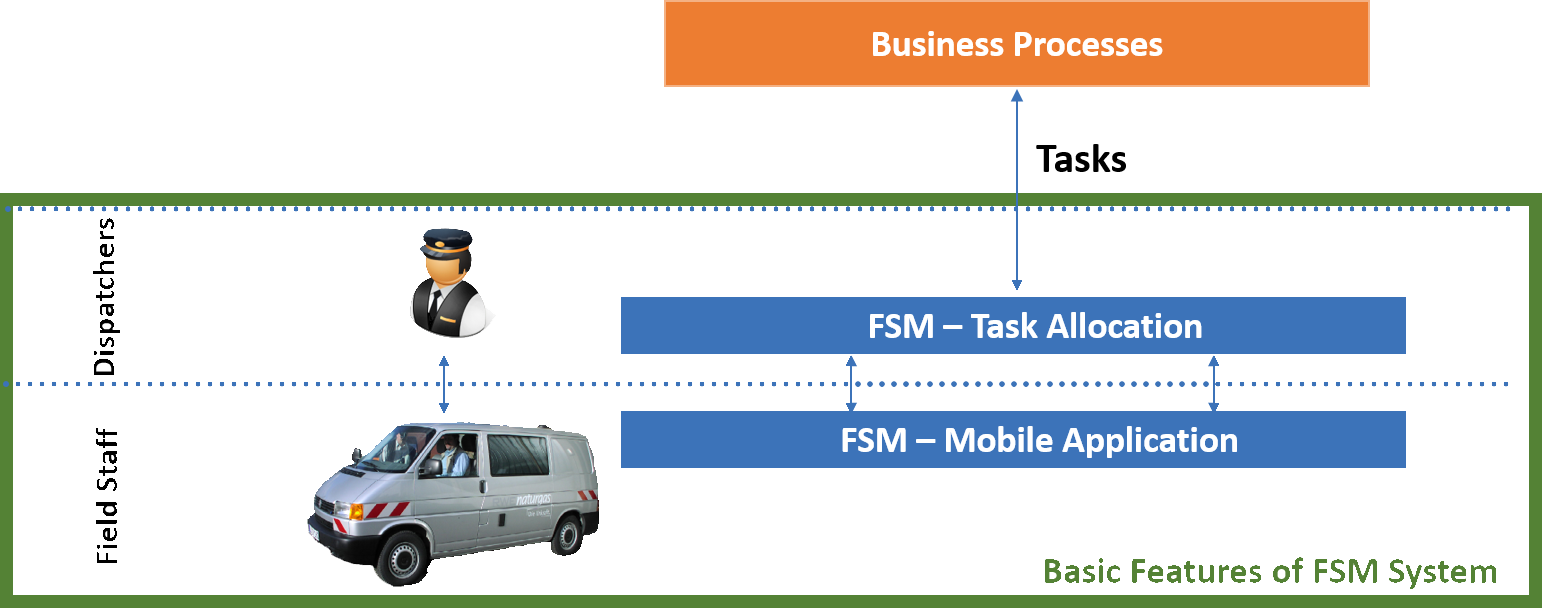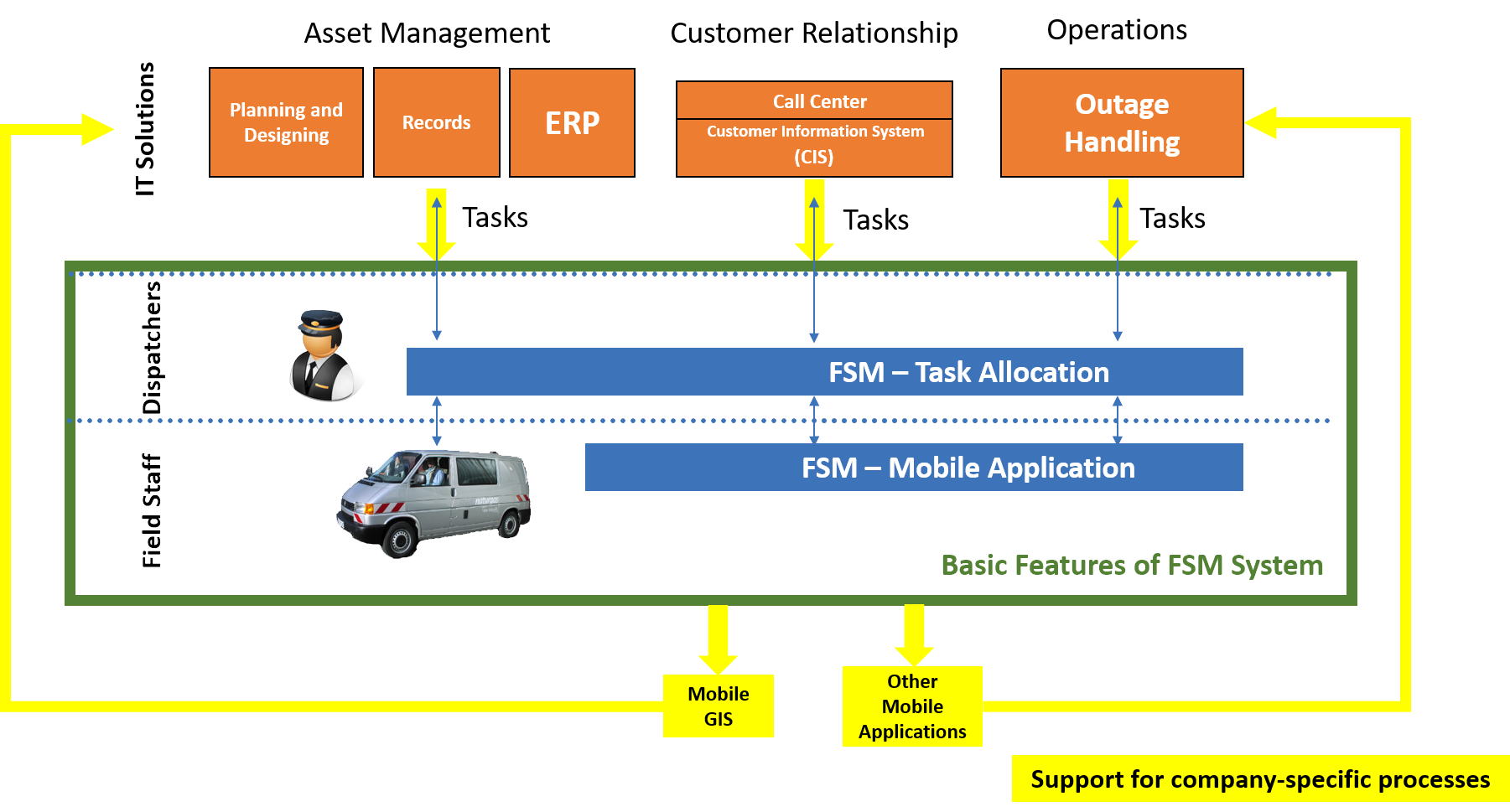
Field Service Management systems (FSM, sometimes also referred to as Mobile Work Force Management – MWFM), are used by companies where a significant number of tasks is performed by field staff. Such companies have distributed assets and/or customers or provide services on distributed resources (e.g. ATM service, “loans at home”, insurance etc.). Usually in such organizations field tasks are handled by separate units, composed of dispatchers, responsible for allocation of tasks, and their subordinate mobile employees. FSM systems support both of these areas through optimization of task allocation, fulfillment control and lowering time needed to complete tasks.

FSM system implementation
Implementation of the FSM system can be divided into two general steps:
- implementation of standard features such as: task management and optimization, basic reporting features (without taking into account industry-specific task execution procedures)
- system enhancements and business processes automation consisting among others of:
a) system adjustment to specific types of tasks and processes
b) integration with other systems used by the company (CRM, ERP, network inventory, vehicle tracking etc.)
c) providing field staff with complete information about current tasks
d) additional field data capture features (needed in a given process or for reporting purposes).

Enhanced automation of business processes goes beyond the standard FSM system features. Such automation is company-specific and depends on the type of fulfilled tasks and on other systems used by the company. Hence, the automation usually requires system customization and development of one or several integrations with other solutions. However, the most important benefits of FSM system implementation relate to basic features of the solution. Among these benefits are:
- improved operational efficiency by 20-50% thanks to better allocation of tasks and use of mobile application for communication with the dispatcher
- reduction of operating costs by 25-35%
- improved dispatchers efficiency by about 40-60% thanks to automation of task allocation
- reduction of overtime hours by 40-60%
- increased customer satisfaction by precise arrangement of visits at the customers’ premises and efficient task fulfillment.
Taking this into account, it is worth to start to start FSM system implementation with the standard version, which will allow to achieve fast and significant benefits from field service optimization while minimizing costs of implementation and maintenance. The standard version of the system (unifying reporting procedures for various types of tasks), provides already approximately 70-80% of benefits in relation to those that could be achieved in a version fully integrated with other systems and strictly adapted to specific needs. In the standard version, we give up expensive integration and customizations gaining the twofold or even threefold reduction of time needed to complete the implementation. Of course, FSM system can be further enhanced and adapted to individual needs. Moreover, decisions on the system customization can be based on experiences concerning the standard implementation.
As regards the implementation of the FSM standard, it is however worth planning analysis of possible customizations (based on the experiences concerning performance of the standard version), owing to which it will be possible to optionally assess the return on investment (ROI). Therefore, the company will be able to make more effective decisions on further FSM investment directions at the subsequent stages of system development.
The main advantages of the proposed approach include:
- reduction of the implementation time to 4-6 months
- lowering or avoiding costs of extensions and integrations
- easier production rollout of the system
- faster return on investment
- lower costs of system maintenance.

Fast implementation of the Field Force Automation system
The Field Force Automation (FFA) system, product of General Electric, is a leading FSM solution. Globema’s approach to the implementation of the standard version (“fast FFA implementation”) is based on the following assumptions:
- FFA system is adopted to the specificity of the customer only at the configuration level (types of tasks, skills of employees, formal structure, optimization criteria, additional fields/attributes). Such adoption excludes development works and specific adaptation to the customer’s requirements
- statuses of tasks and reports are standardized
- implementation costs is lowered thanks to:
a) the scope of system configuration is determined by Globema consultants and based on observation of dispatchers’ and field stuff actual work
b) early access – the application is available to the end user during the implementation
c) FFA trainings based on standard materials (including remote trainings)
d) support at the stage of stabilization
- the scope of the project includes analysis of possible customization of the standard. The analysis includes
a) lessons learned from 2-3 months of use of the standard version
b) analysis of integrations, reports and adaptations.
Results of the fast implementation of the standard FFA system include:
- FFA system providing:
a) possibility of manual input of tasks by dispatchers
b) API to load tasks into the system
c) optimization of task allocation based on types of tasks, skills and availability of employees, SLA, and tasks location (the system is integrated with Google Maps)
d) control of task performance based on statuses synchronized in real time between the mobile device and the dispatcher’s application
e) mobile application for field staff which provide means to change statuses of task, add images and information about tasks fulfillment
f) online synchronization of the mobile application with the server and the off-line work mode
g) online integration with Google navigation
h) standard reports – plan vs. performance per order and team, summary of work per order (travel time and work time), exceeding the SLA
- analysis of profitability and benefits from the customization of the standard system
- technical support
- FFA system administration – for customers who do not have the appropriate IT resources.











